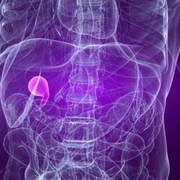 Photo: Getty Images
Photo: Getty Images
A friend of mine who stays in good health through diet and exercise recently found himself with incredible pain from gallstones. A high school teacher, he missed two days of school for a hospital procedure, and he hates being away from his students.
It’s not unusual to get gallstones, pebble-like composites of cholesterol or bilirubin (a waste product) that develop in the gallbladder. In fact, experts say that in 80 percent of cases, gallstones won’t cause trouble.
They can be as small as a grain of sand or as large as a golf ball -- or some combination thereof.
But when gallstones persistently block any of the crucial ducts from the liver to the small intestine, pain and inflammation ensue. My friend was in that 20 percent.
Women are actually at double the risk for gallstones than men. Other risk factors include being overweight, being over 60 years old, and having a family history of gallstones. Recent rapid weight loss, pregnancy, use of birth control pills and hormone therapy are also possible risk factors.
Ethnicity plays a role as well, with Native Americans and Mexican Americans being at greater risk than other groups. Diabetes is yet another reason to be on the lookout for gallstones.
If you take cholesterol-lowering drugs, be aware that, ironically, they increase the cholesterol in bile, which means a greater gallstone risk.
You won’t always know that it’s gallstone pain and inflammation when you feel it, but common symptoms include pain in the upper right abdomen, possibly spreading to the chest and shoulders, and chronic indigestion. You may experience fever, nausea and vomiting, yellowing of the skin or whites of the eyes, and clay-colored stool.
Sometimes the symptoms will subside if the stones move within the gallbladder. But one rule of thumb is that if the pain lasts for more than five hours, it might be a gallbladder “attack.”
If the risk factors for gallstone pain have you worried, here are several preventive measures as suggested by the National Digestive Diseases Information Clearinghouse and DrWeil.com:
-- If you are overweight, find a diet that will help you lose weight slowly and permanently.
-- Drink six to eight glasses of water per day to aid your digestive system in processing fat and moving out waste products.
-- Check your calcium intake. Calcium can help bind bile acids and decrease the risk of stone formation. Because calcium requirements are different for women and men, get advice from a healthcare practitioner.
-- Take 200 mg of supplemental Vitamin C daily. DrWeil.com pointed to a study in which women with higher blood levels of C were half as likely to develop gallstones as those with lower levels.
-- Consider a curcumin supplement, informally known as turmeric. It increases the solubility of bile, according to the DrWeil.com site.
-- Remember the foundations of a good diet, namely, reducing your fat and cholesterol intake, limiting sugar and increasing fiber.
If gallbladder attacks occur frequently, doctors usually recommend a cholecystectomy, or gallbladder removal, typically with laparoscopic surgery.
But try to avoid that surgery in the first place by following the guidelines above for gallstone prevention.
Sources:
“Gallstones.” National Digestive Diseases Information Clearinghouse. Web. 22 Feb. 2012.
http://digestive.niddk.nih.gov/ddiseases/pubs/gallstones/index.aspx
“Condition Care Guide: Gallstones.” DrWeil.com. Web. 22 Feb. 2012. http://www.drweil.com/drw/u/ART02972/Gallstones.html
Reviewed February 23, 2012
by Michele Blacksberg RN
Edited by Jessica Obert






Add a CommentComments
There are no comments yet. Be the first one and get the conversation started!